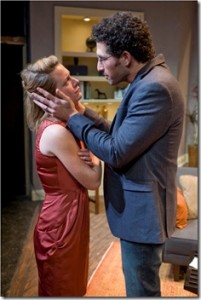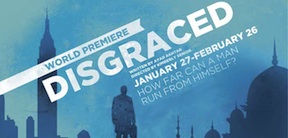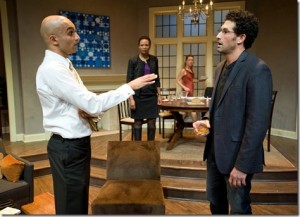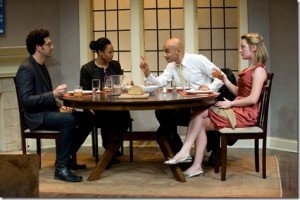IS THERE A RECONCILIATION IN SIGHT?
Every dedicated theatergoer should attend both Race at the Goodman Theatre, and Disgraced – which just opened at the American Theater Company, even though both shows will evoke a pretty bleak vision of culture wars in the United States. Both dramas see the gulf as virtually irreconcilable, largely through intolerance, suspicion, and conflicting views of history, whether between blacks and whites (Race) or Muslim and non-Muslim Americans (Disgraced), Coincidentally, both plays have only a few characters, a single set, and concise playing times (Disgraced runs 70 minutes). But that’s plenty long enough for both dramas to push a great deal of very intense buttons.
Ayad Akhtar, a Milwaukee-born writer whose parents immigrated to the United States from Pakistan, penned this world premiere at ATC. The story centers on Amir Kapoor (Usman Ally) a hard-driving lawyer and an admitted apostate from his native Islamic faith. Amir is married to Emily (Lee Stark), a white American woman and a promising painter. The other characters are Amir’s young nephew (Behzad Dahu), and Amir’s friends Isaac (Benim Foster), an art museum curator, and his wife Jory (Alana Arenas), who works with Amir at a high-powered law firm.
Much of the dialogue discusses aspects of Islam distilled through the sensibilities of Muslims and non-Muslims. Amir believes the religion is too wedded to its roots as a seventh-century desert tribal faith that embraced violence as a natural component. There are deliberations of the Muslim’s negative image in the United States, inflamed by racial profiling and a general sense of mistrust among non-Muslim Americans to the Muslims in their midst.
Near the end of the play, Amir’s nephew delivers an impassioned defense of traditional Islam and a condemnation of the Western world for colonizing his religion over the past 300 years. The lad insists that Islam has been “disgraced” by Western domination, a loaded word that suggests the playwright may be on the nephew’s side. Or perhaps Akhtar is merely giving voice to a certain segment of the Islamic population in this country. In any case, the nephew is eloquent and persuasive, and if his attitude represents the anger and determination of a large percentage of his fellow Muslims, the West is in for a very hard time.
The play does articulate the dilemma of Muslim Americans, trying to make a place for themselves in a country that offers them more opportunity than the lands of their ancestors but often treats them as potentially dangerous outsiders. And at least for Amir – and by extension many others like him – an identity crisis exists. The opposing pulls of Western values with Islam take a severe psychological toll. Even as Amir freely proclaims his rejection of his Islamic roots, he acknowledges that those roots will always be within him, and indeed they surface violently near the end of the play.
Disgraced is a bit too schematic at times. Isaac is Jewish and his wife is black. With Emily’s WASP background, that conveniently touches all the major ethnic and religious bases. The assessments and debates that consume much of the play are verbal arias that have a strong whiff of the didactic, though they are informative and stimulating. Not many plays approach Western-Islamic relations from the Islamic point of view, and Akhtar gives the audience much to chew over as they leave the theater.
Akhtar’s conclusion, at least as his play spoke to me, must be that Western values and traditional Islamic values can’t be reconciled. The specters of 9/11 and the Taliban in Western thinking and centuries of Western abuse in Islamic thinking create barriers that will always exist. An uneasy peace may be the best the West can hope for.
 The production, under Kimberly Senior’s savvy directing, builds slowly to a ferocious finish. The playwright does muddy the narrative toward the end, injecting matters of adultery that raise the temperature of the action without illuminating the central issues of cultural identity and culture wars. And in having a Muslim, a Jew, an African American, and a WASP on stage does stack the deck. But if characters are too pat in their diversity, they also provide the incendiary components for plenty of dramatic and unsettling dialogue.
The production, under Kimberly Senior’s savvy directing, builds slowly to a ferocious finish. The playwright does muddy the narrative toward the end, injecting matters of adultery that raise the temperature of the action without illuminating the central issues of cultural identity and culture wars. And in having a Muslim, a Jew, an African American, and a WASP on stage does stack the deck. But if characters are too pat in their diversity, they also provide the incendiary components for plenty of dramatic and unsettling dialogue.
The exemplary cast is led by Usman Ally, who goes from triumph to triumph on the local theater scene. He starts off assured and in control, then gradually plummets into violence and, finally, despair. Lee Stark gives a superbly sensitive and convincing performance as Emily, whose world comes crashing down as the rhetoric heats up (complicated by the adultery element I found unconvincing). Benim Foster and Alana Arenas are outstanding as the interracial couple and Behzad Dabu is excellent as the young spokesman for militant Islam, who still prays fervently to be allowed to remain in the United States with a threat of deportation hanging over him.
photos by Michael Brosilow
Disgraced
American Theater Company in Chicago
ends on March 11, 2012
[on March 4, 2018, American Theater Company
ceased operations; more on this story at Chicago Tribune]



